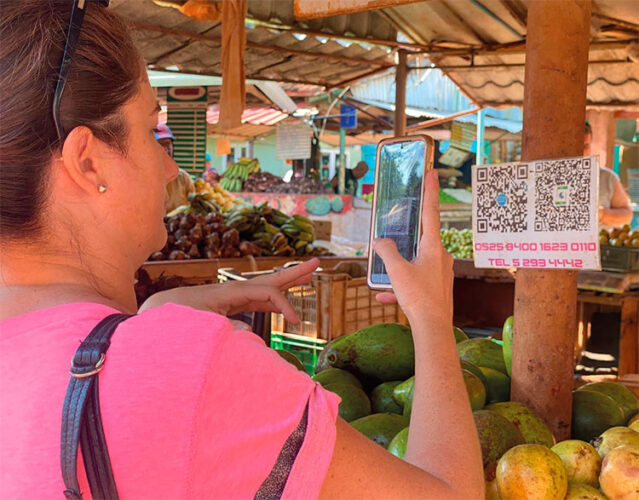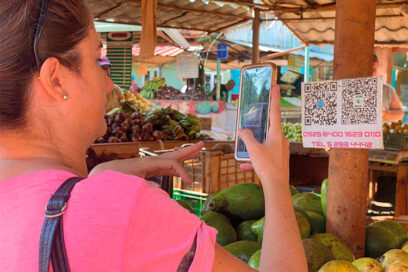A quick process, some say. Others say they are at a crossroads, where technology has not kept up with reality and they have to go back to the traditional way. The truth is that although electronic payments are an alternative that is gaining ground in Cuban society, there is still a long way to go.

The use of gateways such as Transfermóvil and Enzona facilitates the payment of basic services such as electricity, telephone, water and even food. This is a real breakthrough as it guarantees a viable, efficient, secure and cost-saving solution in the midst of the country’s growing economic crisis.
Although there is a margin for adaptation, analysis is necessary. This text arises from the need to understand the correct functioning of bankarization, in which not everyone is involved and others hardly understand it. So, what is the current situation, why, if it is a favorable process, do deficiencies persist, and does it not mean the solution in the midst of the lack of cash?
The First Part
«It has become difficult to get cash, the long lines at ATMs are exhausting and not always bearable. The best thing is to come here. It is convenient, relatively cheap and you can make your purchase using digital payments. That’s why I always buy my farm produce here.
This is what Claudia Barroso, a resident of the Boyeros neighborhood in Havana, told Trabajadores while making her daily purchase at the Tulipán agro-market run by the Youth Labor Army (EJT in Spanish) in Plaza de la Revolución. There, the points of sale, all owned by self-employed workers (TCP in Spanish), have the QR code for the transaction. Declared a banking zone, it is one of the places in the capital where purchases can be made through online payment, with the certainty of receiving the bonus.
Jorge de la Hoz Vidal, director of the agricultural market, explained that the area has about 60 agricultural weighing scales, all under banking, which weekly register more than 500 operations and collect almost one million pesos in transfers. «However, we still have deficiencies related to technology and the electro-energetic situation, such as problems with connectivity and the delay of money entering the account.»
One of the TCPs and head of the platform, Ariel Rodríguez Montero, explained that online payment is mandatory, although cash is not rejected. «We recently received 42 operations that reported more than 28 thousand pesos in one day, figures that vary according to the willingness of the consumer».
Resolution 111/2023 of the Central Bank of Cuba (BCC) approves the rules on the limits of cash collections and payments in local currency, its deposit, withdrawal and ownership. Therefore, bankarization is a necessary process that allows both individuals and companies to join the financial system in order to have access to banking services and avoid dependence on physical currency to purchase goods and services.
In an interview with national television, Alberto Quiñones Betancourt, vice president of the BCC, stated that «bankarization is not new, it has been on the road since 1997. It does not deny cash and is betting, more and more, on digital payments, where the conditions and the opportunity exist to promote them».
Many say «turn a deaf ear to foolish comments», although many do, others disguise the online payment as a wire transfer to avoid losses. And therein lies one of the problems: an online payment is not the same as a wire transfer. Is the process the same in both cases?
In this regard, Quiñones Betancourt pointed out that the difference lies in the fact that the online payment is an action performed by a person who delivers money (cash or digital) to purchase a product or service, while the transfer is a banking service through which a monetary asset is transferred from one person to another (natural or legal).
Businesses that use the online payment service from any of the platforms receive a 6% discount, which means that the consumer receives his or her service product with this discount, without affecting the business (all this is assumed by the bank as a financial cost), he added.
As a client, you decide which payment form you want to use. It is a fact that if the bankarization had not been implemented, despite the problems that Cuba faces, the situation would have been worse, given the demand for cash and the new economic players, he concluded.
The Other Side of the Coin
A young woman with her two-year-old baby stood in a long line of people trying to withdraw cash from one of the two operating ATMs at the Banco de Crédito y Comercio, located on General García and José Antonio Saco streets in Bayamo, with obvious signs of distress.
She said her name was Yamila Toranzo Martínez and that she was willing to spend as much time as necessary to achieve her goal.
«I live in a community of Buey Arriba (municipality of Granma, about 35 kilometers from the capital of the territory) and my family is dedicated to raising cattle. My father is paid for the contracted production in a fiscal account linked to a magnetic card, and it is difficult for us to withdraw money in this way. That’s why I have to take advantage when I come to Bayamo, because the problem of transportation also complicates things,» she added with a gesture of conformity.
Experiences of this type are common; however, not all the protagonists take the same position. In the province of Granma, there is an urgent need to adopt measures to reduce the problem, considering that of the 13 municipalities that make up the province, only three (Bayamo, Manzanillo and Media Luna) have ATMs to withdraw cash, so that the percentage of users with magnetic cards who have access to these facilities is almost minimal; meanwhile, the deficit of high denomination banknotes in banking institutions is a predisposing problem.
Rolando González Aguilar, delegate of the Ministry of Communications in the province, pointed out that among the provisions adopted, the use of payment gateways in the government and non-government sectors stands out.
«Little by little, we are completing the process, area by area, so that businesses of all types located in them begin to use operations on digital platforms; that is, we are informing people of the places where they can visit with confidence because all their units have the payment gateway established. An example of this is the Paseo Bayamés.
According to the official, 39 perimeters have been identified, and it is Bayamo, the capital, where the work has been done most quickly. Similarly, the deficiencies are related to the issue of connectivity, since there are about 26 areas with less coverage for mobile phones; the refusal of some establishments to receive payments by this means, especially in the private sector, where they also overestimate the price of the product or service when the customer requests to pay by electronic channel; as well as the lack of control by the relevant authorities.
And the Solution, in Whose Hands?
The reality of Cubans who have found a relief in banking due to the lack of cash in the country is not always encouraging, as there are still businesses that require payment in cash. It is in everyone’s interest to be aware of the benefits of banking.
We live in a time where there are great limitations due to the lack of a functioning exchange system. However, be well informed and remember that there is no limit to the amount of money you can use. Do not allow them to demand the form of payment and even less the online payment disguised as a transfer. All invoices are valid. It is up to the people to examine and see bankarization as a permanent alternative, not an imposition.


